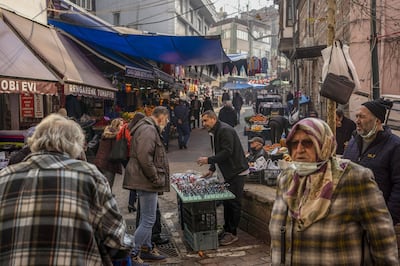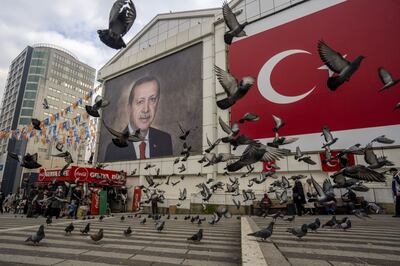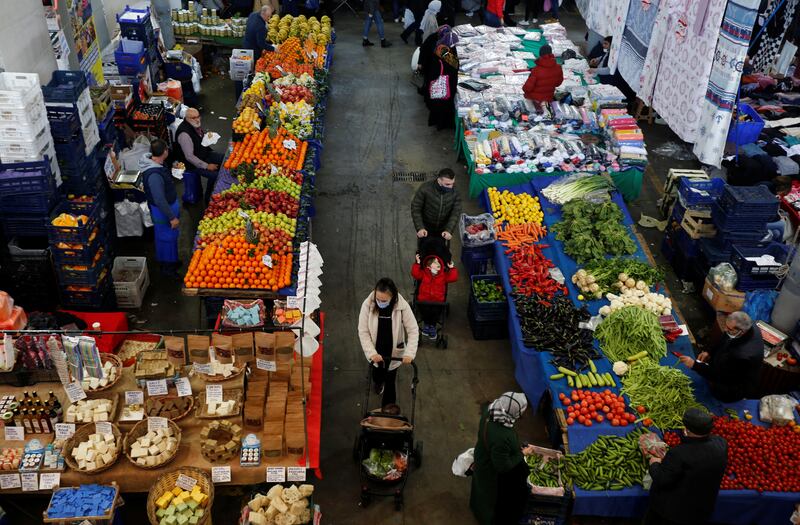Standing in the shadow of Nuruosmaniye Mosque in Istanbul’s historic Fatih district, Omer Yurtman shrugs his shoulders and gazes down in despair over rocketing prices.
“I don’t know how I am going to survive these next months,” he said. “It’s very difficult for me, everything gets more expensive day by day. I can’t keep up.”
Like most Turks, Mr Yurtman, 67, is trying to come to terms with runaway inflation that has bitten deep into the meagre income he makes selling pens and tissues on the street to supplement his pension.
Turkey reported year-on-year price rises of 36 per cent for December on Monday, the highest rate since President Recep Tayyip Erdogan’s Justice and Development Party (AKP) took power nearly 20 years ago.
In the early years of his rule, Mr Erdogan made good on pledges to improve the lot of less well-off Turks and the country enjoyed a period of economic boom. But since a 2018 currency crisis, the economy has been steadily deteriorating, culminating in high inflation and unemployment.
The performance of the Turkish lira, which lost 44 per cent of its value against the US dollar last year, has aggravated spiralling prices in a country reliant on imports.

Places such as Fatih, which sits within the walls of pre-Ottoman Constantinople, are home to many of Mr Erdogan’s base: religiously and politically conservative families on low incomes.
The district backed the AKP in every election since its coming to power in late 2002 but three years ago the trend was bucked in a re-run of local polls. After the initial vote across Istanbul was cancelled, opposition mayoral candidate Ekrem Imamoglu was elected by voters, including those in Fatih.
“I’ve voted for Erdogan since he was Istanbul’s mayor,” said Mr Yurtman, referring to Mr Erdogan’s time as mayor in the 1990s. “I’m not sure now. I still trust him but something has to change, we can’t go on like this.”
Turkey is due to hold elections by mid-2023 but given the economic situation many feel Mr Erdogan, whose poll ratings have mirrored the trajectory of the economy, will call an early vote if there is any sign of improvement.
In recent weeks the president has introduced a number of measures to ease the public’s woes, including a 50 per cent rise in the minimum wage and income rises for pensioners and civil servants.
Many predict the allowances will be gobbled up by inflation, which independent economists at the Inflation Research Group put at a startling 83 per cent for the year.
A survey last month by respected polling firm MetroPoll showed that six in 10 Turks felt prices had at least doubled over the year.
There is one anti-inflationary action that Mr Erdogan will not countenance, even though it is favoured by most economists, and that is raising interest rates.
The Central Bank has lowered rates by five percentage points since September. Although the bank is nominally independent, Mr Erdogan has sacked three bank governors in as many years and dismissed other senior officials said to back interest rate increases.

“The current disaster is because of one person and that’s the president,” said Savas, a 23-year-old computer science student as he waited for a bus by the port of Eminonu, where the Golden Horn meets the Bosphorus.
“No one understands why he won’t do what everyone says and put up interest. Someone has to be making some money from it but for most people it’s just increasing our misery and making life a lot more difficult.”
Savas, who declined to give his surname, said he lives in a shared apartment with three other students. “We can barely afford the rent and bills and we have to be careful what we buy at the market. I haven’t eaten meat in a long time.”
According to Monday’s figures from the government’s statistics agency, the annual rise in food prices was 43.8 per cent. Households were also hit with rising energy costs as the new year arrived, with the price of electricity up by 50 per cent and gas by 25 per cent.
“It’s fine for them,” said Busra Turel, 46, as she gestured at a group of tourists from her cafe in one of the back alleys leading up the hill from the port. “They come with their euros and dollars and everything is cheap. We only have lira and we can’t escape.
“I don’t see how Erdogan can stay any longer. People are tired of this struggle. He’s the only one with any power to do something but he doesn’t.”
The president has promised to bring down inflation.
“We are determined not to leave our citizens burdened by the fluctuation in the exchange rate or the exorbitant price increases,” he told AKP delegates on Tuesday.
Mr Erdogan, though, may have trouble convincing voters of that he holds the key to a turnaround in the near future.
“The government got us in this trouble,” said student Savas, “but I think we need somebody new to get us out.”







